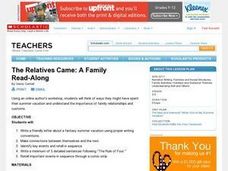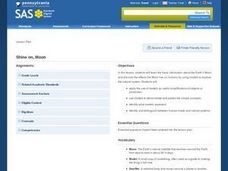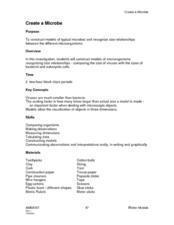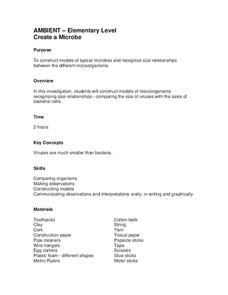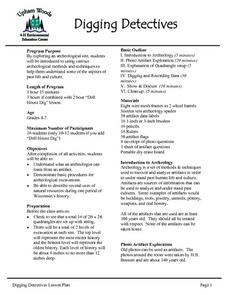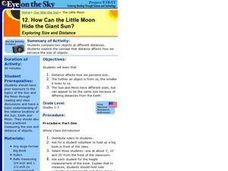Curated OER
Fossil Fuels (Part I), The Geology of Oil
Junior geologists work through three mini-lessons that familiarize them with the formation and location of fossil fuels. Part one involves reading about petroleum and where it comes from via a thorough set of handouts. A lab activity...
Curated OER
The Relatives Came Family Read-Along
Third graders brainstorm on what they believe they do on their summer vacation. They explore how family and relatives are important in their lives. They read along with their teacher a book about relatives.
Curated OER
Heating and Cooling a Really Large Lizard
Remind your middle school scientists how fox ear size varies depending on the climate they live in; large ears allow heat loss while small ears keep heat in. Discuss how a cold-blooded animal might try to regulate body temperature. Then...
Curated OER
Arctic Animals: How Do They Measure Up?
Young scientists grab their measuring tapes, rulers, and yard sticks as they see how big Arctic animals really are. To conceptualize the trait of height or length, each small group will measure out the entire length of an arctic animal....
Curated OER
Seed to Plant
Students understand the stages of a plants life. For this stages of plant development lesson, students read about bean plants and grow their own. Students record growth and photograph changes in their plants. Students label the parts of...
Curated OER
Reaction Time
Students investigate their reaction times for grabbing a dropped ruler after discussing reactions times to other events such as moving your foot from the gas pedal to the brake. They drop the ruler from a sent height and record the time...
Curated OER
Shine On, Moon
Pupils explore space science by conducting an experiment in class. In this Moon lesson, students define a list of space science vocabulary and read the book The Moon. Pupils utilize shoeboxes and string to conduct a sunlight experiment...
Curated OER
"How Do You Measure Up?"
Fourth graders explore basic measurements by analyzing their own bodies. In this human anatomy lesson, 4th graders identify the units used to measure a human body such as centimeters, inches, ounces and pounds. Students complete a...
Curated OER
Fun With Rainfall Measurements
Demonstrate how rain is measured. Pupils will use a rain gauge to measure the amount of rainfall during one week. Then record the data and discuss the results.
Alabama Learning Exchange
Straight Line Motion
Students examine gravity, mass, and friction. In this speed and motion instructional activity, students investigate how straight line motion is impacted by gravity, mass, and fiction as they participate in a hands-on activity.
Curated OER
Tracing Highs and Lows in San Francisco
On a topographic map, students identify the scale bar, north arrow, and contour interval. They then locate a hill on the map and make note of the contour lines. Students then locate other places with similar contour line patterns....
Curated OER
Create a Microbe
Students construct models of microorganisms recognizing size relationships-comparing the size of viruses with the sizes of bacterial and eukaryotic cells. They put into perspective just how small microbes are by comparing the size of...
Curated OER
Measuring Rainfall
Students investigate the amount of rain that falls in their area through the construction and monitoring of a rain gauge. The gauge is observed for one week, recordings are made, and observations described in a chart.
Curated OER
What's Its Slope
Students identify the slope of a lines.In this algebra lesson, students define the meaning of slope and write an equation given the slope. They graph linear functions using the slope and y-intercept.
Curated OER
You Can Take the Pressure!
Middle schoolers construct and use a barometer over a period of 1-2 weeks to investigate and predict upcoming weather from barometric pressure.
Curated OER
Neat Feet
Students view a video and discuss different kinds of feet found in the animal kingdom. They make prints using paint, rubber stamps and their own feet and then measure and compare the tracks.
Curated OER
Quadrat Studies
Middle schoolers use quadrats to investigate plants, animals, soils and weather. They answer questions as they fill in each quadrat. They share their information with the class.
Curated OER
Sundials: Observing and Using Shadows
Young scholars build sundials and observe changes in shadows over the course of one or more days. They identify patterns in the shadows and discuss how shadows may be used to tell time.
Curated OER
Create a microbe
Students explore viruses and bacteria. They construct three dimensional models of microorganisms recognizing size relationships by comparing the size of viruses with the sizes of bacterial cells.
Curated OER
Digging Detectives
Students demonstrate basic procedures for archeological excavations. They explore an archeological site, students using various archeological methods and techniques to determine some of the aspects of past life and culture.
Curated OER
Why Study Fractals?
Students explore the concept of fractals. In this fractals lesson, students use the website to research where fractals occur in nature. Students research what fractals are and how fractals are used to solve real world problems.
Curated OER
How Can the Little Moon Hide the Giant Sun? Exploring Size and Distance
Students compare two objects at different distances. They explore the concept that distance affects how we perceive the size of objects.

